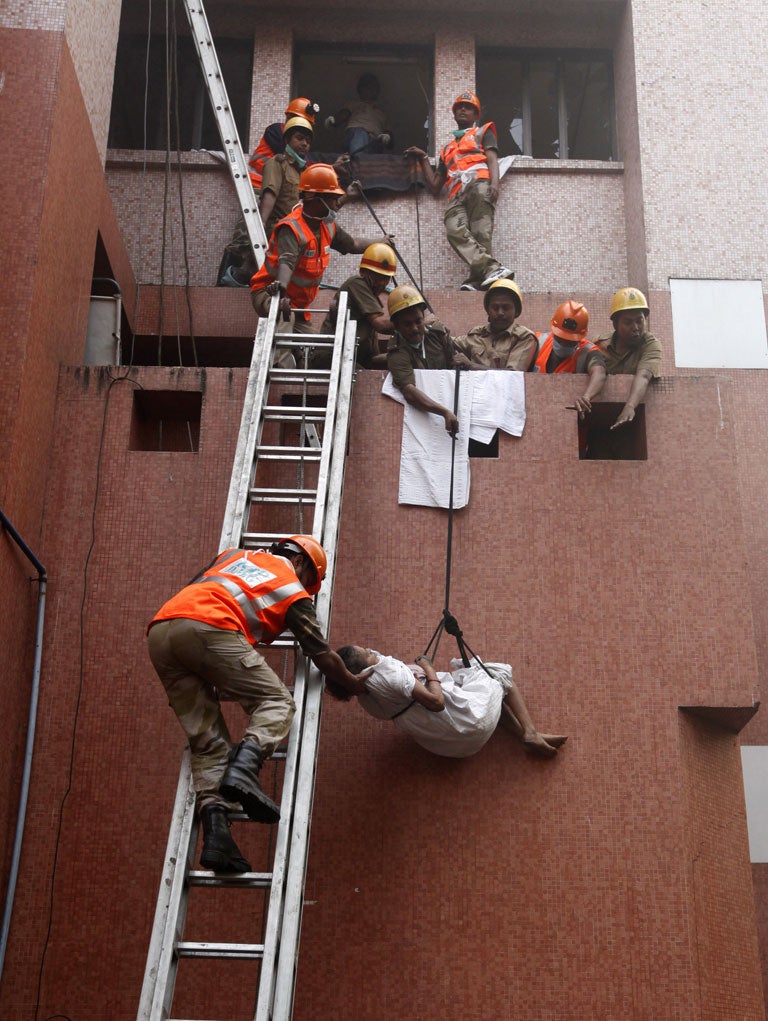Your support helps us to tell the story
From reproductive rights to climate change to Big Tech, The Independent is on the ground when the story is developing. Whether it's investigating the financials of Elon Musk's pro-Trump PAC or producing our latest documentary, 'The A Word', which shines a light on the American women fighting for reproductive rights, we know how important it is to parse out the facts from the messaging.
At such a critical moment in US history, we need reporters on the ground. Your donation allows us to keep sending journalists to speak to both sides of the story.
The Independent is trusted by Americans across the entire political spectrum. And unlike many other quality news outlets, we choose not to lock Americans out of our reporting and analysis with paywalls. We believe quality journalism should be available to everyone, paid for by those who can afford it.
Your support makes all the difference.Fleeing medical staff abandoned patients to a raging fire that killed 89 people in a seven-storey hospital in India, officials said.
Police arrested six hospital officials on charges of culpable homicide in Kolkata, formerly known as Calcutta.
Mamata Banerjee, chief minister of the state of West Bengal, ordered the hospital's licence withdrawn. The hospital denied any violations of safety measures.
"It was horrifying that the hospital authorities did not make any effort to rescue trapped patients," said Subrata Mukherjee, West Bengal state minister for public health engineering. "Senior hospital authorities ran away after the fire broke out."
As the fire spread from the hospital's basement, rescue workers on long ladders smashed windows in the upper floors of the AMRI Hospital to pull surviving patients out before they suffocated from smoke inhalation, while sobbing relatives waited on the street below.
Rescue workers took patients on stretchers and in wheelchairs to a nearby hospital.
Moon Moon Chakraborty, who was in the hospital with a broken ankle, called her husband S. Chakraborty at home to tell him a fire had broken out.
"She had died by the time I reached the hospital," her husband said.
One survivor told Indian television she was sitting by the bedside of her mother, who was on a ventilator, when smoke came into the room.
"My mother was continuously telling me that she was feeling suffocated and uneasy," she said. "I kept ringing the bell for the nurse, but no one came."
Rescue workers managed to evacuate her mother more than two hours after the fire started, she said.
Emergency workers pulled 73 bodies from the building, and another 16 succumbed to their injuries later, said police.
Hospital officials said four of the bodies pulled from the building were those of staff members. The remainder were presumably patients and relatives who were aiding in their care. Many of the dead suffered from smoke inhalation.
At the time of the blaze, there were 160 patients in the 190-bed hospital annex, said Satyabrata Upadhyay, a senior vice president of the AMRI hospital company.
The loss of life was "extremely unfortunate and painful", but the facility followed strict fire safety measures, he said. He promised to give 200,000 rupees (about £2,400) to the relatives of the dead.
"We deeply sympathise and share the pain and agony of the family members of the patients admitted here," he said.
The expensive AMRI private hospital was recently rated one of the best hospitals in the city by an Indian magazine.
However, safety regulations are routinely ignored at hospitals throughout India, where it is not uncommon for fire extinguishers, if they are present at all, to be several years old and never serviced. Few buildings have fire escapes, and fire drills are virtually unheard of.
The blaze erupted about 3:30 am in the building's basement, and heavy smoke quickly engulfed the hospital. The area was used for storage, but the cause of the fire was not immediately known.
The fire and the smoke were first noticed by residents of a massive slum close to the hospital, according to witnesses.
Some of them rushed to the hospital and raised an alarm, but security guards stopped them, saying there was a small fire in the kitchen and no cause for worry. As the smoke enveloped the building, the slum dwellers joined in the rescue effort.
It took firefighters more than an hour to arrive after the blaze started, said Pradeep Sarkar, a witness. His uncle was in the hospital after having a heart attack and was moved to another hospital after the fire.
Narrow streets apparently made it difficult for fire trucks to get close to the building and for firefighters to bring in the big hydraulic ladders needed to evacuate those trapped inside. Eventually, they smashed the main gate to make way for the ladders.
Banerjee, the chief minister, said that while the fire brigade was delayed, police arrived quickly to help with the rescue effort.
Patients and relatives complained that hospital staff did little to help and that smoke detectors failed to go off.
Sudipta Nundy said his brother-in-law Amitabha Das was being treated for an infection at the hospital. He died by the time rescuers arrived at his smoke-filled ward.
"He would have survived had hospital authorities allowed outsiders in early to evacuate the patients," he said.
Dozens of fire engines eventually arrived at the hospital. By midmorning, the fire was under control and most of the patients had been moved to other hospitals, said Javed Khan, the state fire services minister.
But state officials said the hospital staff did nothing to aid in the rescue operations.
"It's a very serious offence, and we will take the strongest action," said Banerjee.
Not all patients said they were abandoned.
Jyoti Chaudhary, a patient in his late 60s, was lucky to survive. "With the help of a hospital worker, I came down the staircase and later was moved to a nearby hospital."

Join our commenting forum
Join thought-provoking conversations, follow other Independent readers and see their replies
Comments